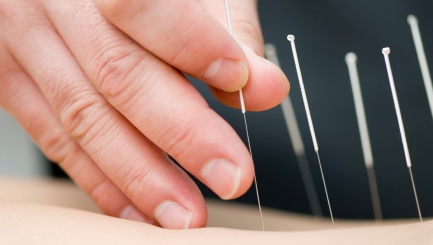The Amazing Wellness Possibilities Of Acupressure
 Acupressure provides a valuable tool for communicating with your own body. By applying pressure on certain points along your body’s energy meridians, you can actually affect how it responds to pain and illness. A full knowledge of the body’s acupressure points would take years to master, but a visit to a good complementary therapist could allow you to learn the most important ones for you and how to use them when needed. It is a kind of ‘manual medicine’ that gives you direct and immediate control over your wellness.
Acupressure provides a valuable tool for communicating with your own body. By applying pressure on certain points along your body’s energy meridians, you can actually affect how it responds to pain and illness. A full knowledge of the body’s acupressure points would take years to master, but a visit to a good complementary therapist could allow you to learn the most important ones for you and how to use them when needed. It is a kind of ‘manual medicine’ that gives you direct and immediate control over your wellness.
Acupressure is similar to acupuncture, but larger areas of pressure, such as thumb or palm, take the place of needles. The theoretical background is the same however, and based on a model of the bodily system that incorporates Qi flow, energy meridians, Yin and Yang and the five elements. Despite the obvious disparities between this system and our own modern scientific mindset, the results of acupressure have been substantiated by numerous scientific studies.
Evidence for the efficacy of acupressure in dealing with pain is said to be ‘fairly strong’, according to scientists who evaluated the results of multiple studies demonstrating the effects of acupressure on various types of pain. Interestingly, acupressure is thought to be more useful for more severe types of pain, such as menstruation, labour pain and lower back pain. Evidence for instances of minor pains such as headaches and dental pain is less convincing, but this is probably due to the small scale of research undertaken thus far.
The same group of scientists also produced a comparative study on the effects of acupressure on nausea and vomiting, and here the results were proven beyond doubt. Acupressure was seen to provide a highly effective tool in dealing with post-operative nausea, and looks likely to become a widespread method for dealing with the side effects of chemotherapy. It has also been found that acupressure improves the quality of sleep, as well as stress, anxiety and dementia in a number of mid-scale studies on institutionalised elderly patients.
Bearing in mind the limited amount of scientific research that has taken place, acupressure has some very convincing research behind it. It seems to be a wellbeing technique that could quite easily evolve to become a common way of allowing us to manage our own chronic conditions. Indeed, the knowledge of just two or three acupressure points, learnt under the guidance of a qualified professional, could help you become the master of your own wellbeing.


Comments are closed.